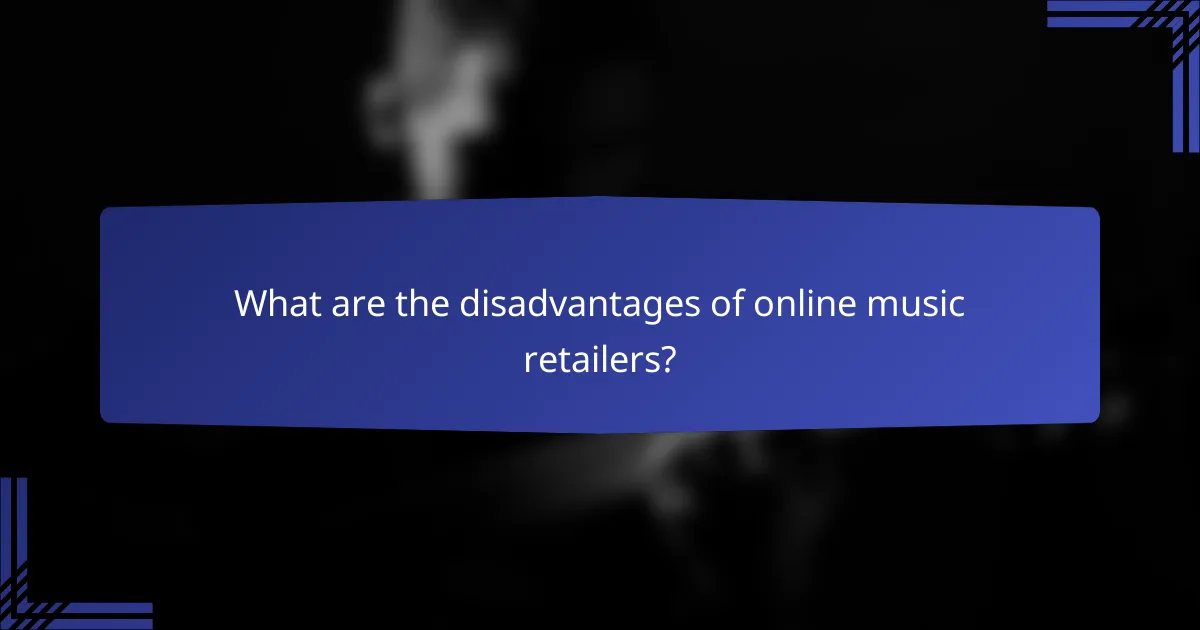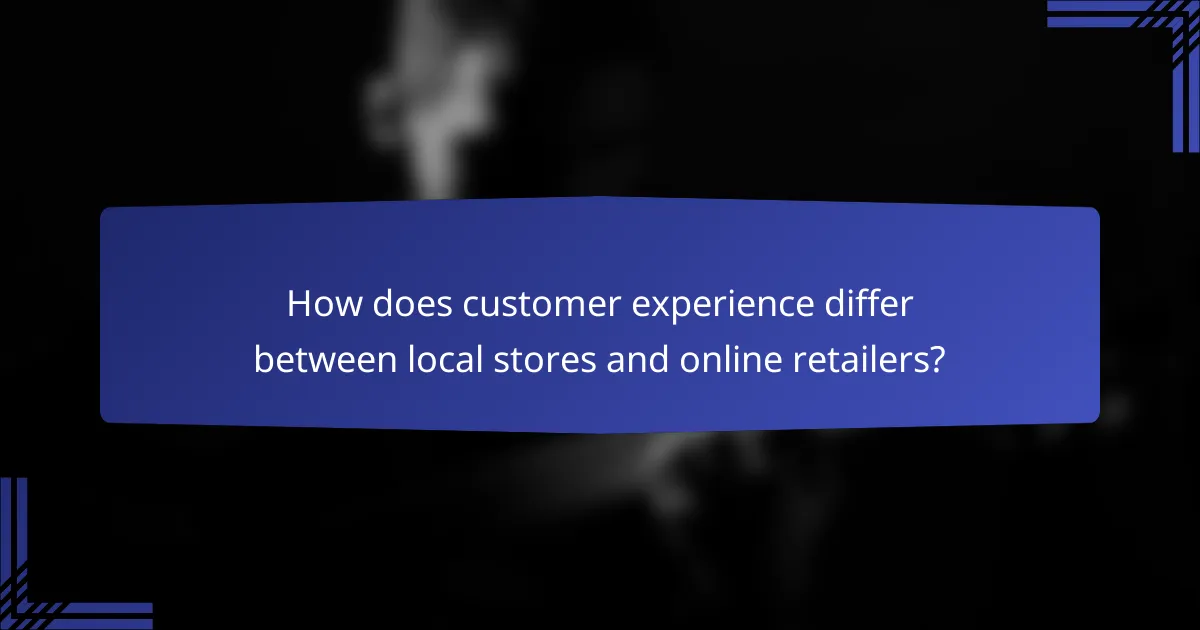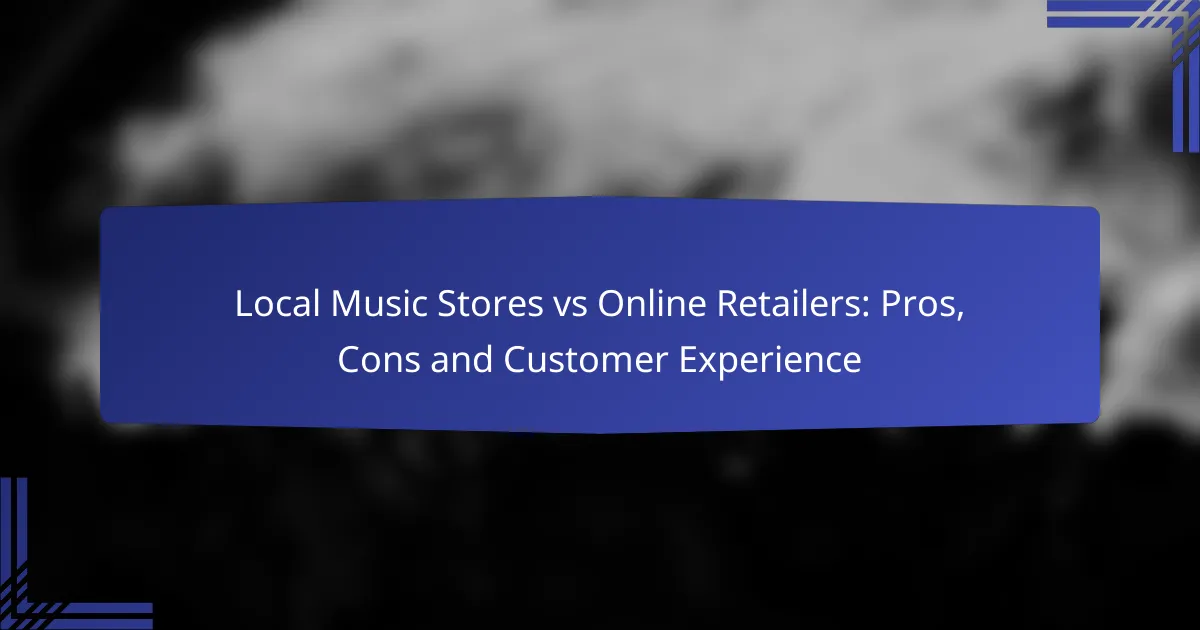In the debate between local music stores and online retailers, each option presents distinct advantages and challenges for customers. Local stores provide personalized service and a community atmosphere, while online retailers boast a wider selection and often lower prices. Understanding these pros and cons can help consumers make informed choices that best suit their musical needs.

What are the pros of local music stores?
Local music stores offer several advantages over online retailers, including personalized service, the ability to physically test instruments, and support for local musicians. These benefits create a unique shopping experience that can enhance customer satisfaction and foster community connections.
Personalized customer service
Local music stores typically provide personalized customer service that online retailers cannot match. Staff members are often knowledgeable musicians themselves and can offer tailored advice based on individual needs and preferences. This one-on-one interaction allows customers to ask questions and receive immediate feedback, enhancing the overall shopping experience.
Additionally, local stores often build relationships with their customers, leading to better recommendations and support over time. This personal touch can make a significant difference, especially for beginners seeking guidance on their musical journey.
Ability to test instruments
One of the key advantages of local music stores is the opportunity to test instruments before purchasing. Customers can physically play guitars, pianos, or any other instruments to assess their sound and feel. This hands-on experience is crucial for making informed decisions, as it allows musicians to find the right fit for their style and comfort.
Moreover, local stores often have a variety of brands and models available, giving customers the chance to compare options side by side. This tactile experience can lead to greater satisfaction with the purchase, reducing the likelihood of returns or exchanges.
Support for local musicians
Shopping at local music stores supports the local music community, which is vital for fostering talent and creativity. These stores often host events, workshops, and live performances, providing a platform for local musicians to showcase their work. By purchasing from these retailers, customers contribute to the sustainability of the local music scene.
Furthermore, many local stores carry products from regional artists, including instruments, accessories, and merchandise. This not only helps promote local talent but also allows customers to discover unique items that may not be available through larger online retailers.

What are the cons of local music stores?
Local music stores have several drawbacks that can impact the shopping experience. These include limited inventory, higher prices compared to online retailers, and inconvenient operating hours that may not suit all customers.
Limited inventory
Local music stores often carry a narrower selection of instruments, accessories, and sheet music than online retailers. This limitation can make it challenging for customers to find specific items, especially niche products or the latest releases. For example, a local store may only stock popular brands, while online options can include a wider variety of choices.
Customers looking for rare instruments or specialized gear may find that local shops do not have what they need in stock. It’s advisable to call ahead or check the store’s website to confirm availability before making a trip.
Higher prices
Prices at local music stores can be higher than those found online due to overhead costs such as rent and staffing. This can make it less appealing for budget-conscious shoppers who are looking for the best deals. For instance, a guitar that costs $300 in a local shop might be available online for $250 or less.
While supporting local businesses is important, customers should weigh the benefits against the potential for significant savings when shopping online. Comparing prices across platforms can help ensure you get the best value for your money.
Inconvenient hours
Many local music stores operate on limited hours, which can be inconvenient for customers with busy schedules. Typical hours might be 10 AM to 6 PM on weekdays, leaving little time for those who work standard hours to visit. This can lead to missed opportunities for purchasing needed items.
To avoid frustration, check the store’s hours online or consider visiting during off-peak times, such as weekday mornings. Alternatively, online shopping offers the flexibility to browse and purchase at any time, making it a more convenient option for many customers.

What are the advantages of online music retailers?
Online music retailers offer several advantages, including a broader selection of products, competitive pricing, and the convenience of shopping from anywhere. These benefits make them appealing to many consumers looking for music-related items.
Wider selection of products
Online music retailers typically provide a much larger inventory compared to local stores. This means you can find a diverse range of instruments, accessories, and music genres that may not be available in your area.
For example, if you’re searching for a rare vinyl record or a specific guitar model, online platforms often have extensive catalogs that include both new and used items. This variety allows you to explore options that suit your preferences and budget.
Competitive pricing
Online music retailers often offer lower prices than physical stores due to reduced overhead costs. This can lead to significant savings, especially when shopping for expensive instruments or equipment.
Many online platforms also provide price comparison tools, allowing you to quickly find the best deals. Additionally, seasonal sales and discounts can further enhance affordability, making it easier to purchase high-quality items without breaking the bank.
Convenience of shopping
Shopping online for music products is incredibly convenient, as you can browse and purchase items from the comfort of your home at any time. This eliminates the need to travel to multiple stores, saving you time and effort.
Furthermore, many online retailers offer easy return policies and customer support, ensuring a smooth shopping experience. You can read reviews and compare products before making a decision, which can be particularly helpful for first-time buyers or those unfamiliar with specific brands.

What are the disadvantages of online music retailers?
Online music retailers have several disadvantages that can affect the overall shopping experience. Key drawbacks include the inability to physically interact with products, potential shipping costs and delays, and often complicated return policies.
No hands-on experience
One significant disadvantage of online music retailers is the lack of hands-on experience. Customers cannot physically test instruments or equipment, which can lead to uncertainty about quality and suitability. For example, trying out a guitar in-store allows you to assess its feel and sound, something that cannot be replicated through a screen.
This absence of tactile interaction can result in purchasing items that may not meet expectations, leading to dissatisfaction. It’s crucial for buyers to read reviews and watch demonstration videos to mitigate this issue.
Shipping costs and delays
Shipping costs and delays are common concerns when ordering from online music retailers. Depending on the retailer and location, shipping fees can add significantly to the total cost, sometimes reaching tens of dollars. Additionally, delivery times can vary widely, with some items taking days or even weeks to arrive.
To avoid unexpected expenses, customers should check shipping policies before completing a purchase. Some retailers offer free shipping over a certain amount, which can be a cost-effective option if you plan to buy multiple items.
Return policies
Return policies for online music retailers can often be more complex than those of local stores. Many online retailers have specific guidelines regarding returns, including time limits and condition requirements. For instance, some may only accept returns within 30 days and require items to be in original packaging.
Before making a purchase, it’s essential to review the return policy to understand any potential challenges. Familiarizing yourself with these terms can help prevent frustration if you need to return an item that doesn’t meet your needs.

How does customer experience differ between local stores and online retailers?
Customer experience varies significantly between local music stores and online retailers, primarily in terms of personal interaction and accessibility. Local stores offer face-to-face engagement, while online platforms provide convenience and a broader selection.
In-store interaction vs online reviews
In local music stores, customers benefit from direct interaction with knowledgeable staff who can provide personalized recommendations and hands-on demonstrations. This immediate feedback can enhance the shopping experience, allowing customers to ask questions and receive tailored advice.
In contrast, online retailers rely heavily on customer reviews to guide purchasing decisions. While reviews can offer insights into product quality and user satisfaction, they may lack the immediacy and context that in-store interactions provide. Customers should consider both the quantity and quality of reviews when shopping online.
Community engagement vs anonymity
Local music stores often serve as community hubs, hosting events, workshops, and jam sessions that foster a sense of belonging among musicians and music lovers. This engagement can lead to lasting relationships and a supportive network for local artists.
Online retailers, however, typically offer a more anonymous shopping experience. While this can be convenient, it may lack the personal touch and community connection found in local stores. Customers seeking a sense of community may want to prioritize local shops, while those valuing convenience might lean towards online options.
